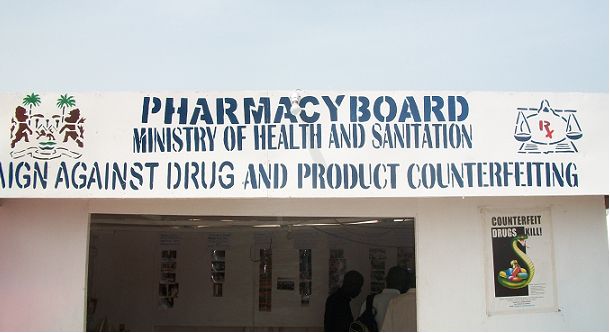Stemming the tide of fake medicine in Sierra Leone
Fighting the growing spate of fake and substandard medicine has been a priority agenda in cleansing the public health of the country. It became apparent in 2001 when the government of Sierra Leone instituted the Pharmacy and Drugs Act 2001 geared towards the empowerment of a drugs and pharmaceutical regulatory body in the guise of the Pharmacy Board-PBSL of Sierra Leone.
Since then, the agenda to ridding the Sierra Leone drugs market of fake and sub standard drugs to uphold, as the governments strides to uphold, a health public around the provision of a serene pharmaceutical and drugs industry. The past government of the SLPP did what it could to ensure that the agenda for a healthier pharmaceutical and drugs industry got its foundation.
However, much was not done then to ensure that structures are put in place and a proactive measures taken to curb the then growing rate of fake drugs that proliferated the conventional drugs market to say the least. Licensed pharmacies and drug stores were deeply entrenched marketers of fake, substandard and expired drug. This situation was ugly considering the fact that the gullible Sierra Leonean public was left with no option and nowhere to turn to for the black market and drugs and pharmaceuticals were equally active and in-fact provided more danger to the well being of the citizenry. The situation all throughout the years running from 2001 to 2007 was hopeless and grossly embarrassing to the country health sector; undoubtedly one of the factors that anchored the country at the bottom of the human development index.
This situation had to change or else ever the formal health sector was not going to survive the malaise that was inflicted by this situation considering the primary and indispensable in public health management.
When the All People Congress Party took the reigns of power in 2007 and thanks to the commitment of the president of the Republic Ernest Bai Koroma to the protection and development of the health of the citizenry and knowing that the pharmaceutical industry formed the basis for that, he took step. He changed management at the sole drugs and pharmaceuticals regulatory body in Sierra Leone the Pharmacy Board. Soaked in the president’s agenda for change, the new management under the industry of Acting Registrar Wiltshire CN Johnson wasted no time to adopt pragmatic and proactive fight to rid the pharmaceutical market of fake and substandard drugs. In no time, under a period of six months, over one billion Leones worth of fake and substand drugs were removed and burnt after an intensive nation-wide raid.
What followed after this development was that over hundred pharmaceutical outlets that did not operate within the provision of the pharmaceutical and drugs act were closed and heavy fines levied on the proprietors under the Pharmacy and Drugs Act. This precedence was the first of its kind and has gone a long way in ensuring that at least the availability of fake drugs is cut down from the dismal 72% in 2007, to under 5% in 2009. This achievement is phenomenal and as it all happened, the World Health Organization-WHO developed keen interest and granted Sierra Leone the privilege of being a member on the WHO drugs monitoring organization beating many other Sub-Regional organizations in Africa.
In the face of these and many other achievements, the country’s pharmaceutical industry has continued to record more goals. This year, four cycles of the pharmaceutical professional Education has seen successful completed, a feat that was apparently not achievable before. This means that pharmacies in all the five pharmaceutical regions in the country-the East, South, North, Kono and the Western Area benefited from sixteen sessions and over 80 different lectures of references and development education instituted by the pharmacy board and the pharmaceutical society of Sierra Leone.
But challenges still remain. The black market of drugs and pharmaceuticals is still being supported by the mass porosity of our borders. This one is hard to fight as the strength and capacity of the PBSL is very low to attack it full and as such drug peddling still strives in the country. If this must change, the PBSL must not be left alone in this, the security sector must join force with it so that the dream to achieve a clean public health sector is attained.
The second and most pronounced challenge comes in the guise of weak laws that could serve as deterrents to potential drug smugglers and peddlers. The Pharmacy and Drugs Act of 2001 needs to be repealed to meet up with the present drive to attain the millennium development goal on health.        Â
Stay with Sierra Express Media, for your trusted place in news!
© 2009, https:. All rights reserved.




